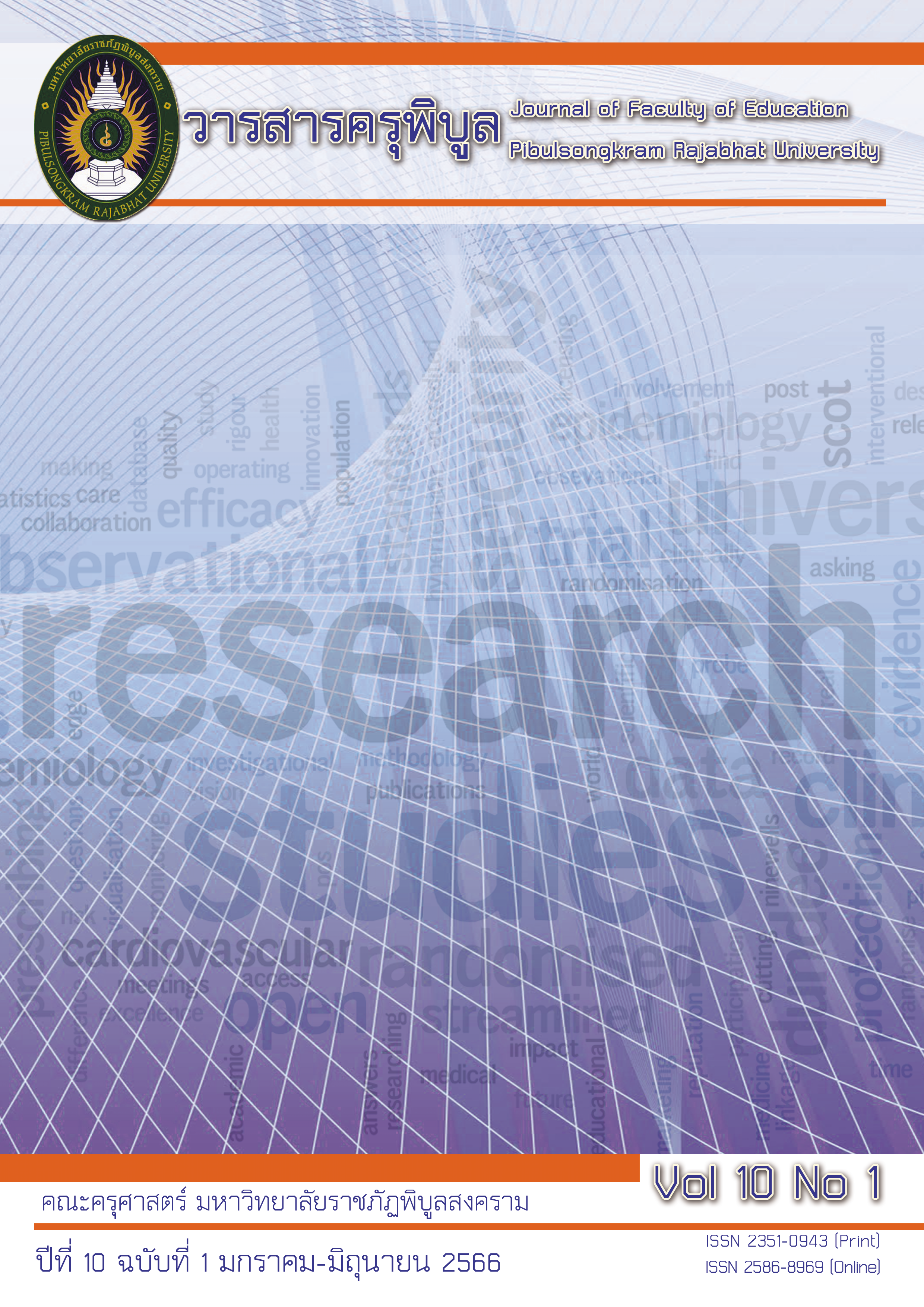THE CORRELATION BETWEEN SELF-TALK AND LEARNING ACHIEVEMENT MOTIVATION OF BACHELOR’S DEGREE STUDENTS AT PIBULSONGKRAM RAJABHAT UNIVERSITY
Keywords:
self-talk, emotional states, learning achievement motivationAbstract
This study aimed to investigate the relationship between self-talk and emotional states of students, as well as the correlation between self-talk, emotional states, and learning achievement motivation among students at Pibulsongkram Rajabhat University. The sample for this correlational research consisted of 148 Bachelor's Degree students enrolled in Human Relations for Teachers and Human Behavior and Self-Development courses, selected using purposive sampling. The criteria for determining the sample size were estimated from the population of hundreds, 15% of the total population was selected as the sample. The study employed three research instruments: a questionnaire on self-talk, a questionnaire on emotional assessment, and a questionnaire on learning achievement motivation. Data analysis statistics were mean and Pearson's product moment correlation.
The results revealed mean scores for students' self-talk and emotional states a tendency of students’ engagement in more encouraging self-talk (M = 3.66) than pressured self-talk (M = 1.92). Additionally, the findings indicated that students tend to experience more positive emotional states (M = 3.79) than negative emotional states (M = 1.99).
The correlation analysis showed that a statistically significant negative correlation exists (at the moderate level) between encouraging self-talk and pressured self-talk (p < 0.001). Furthermore, the correlation between self-talk and emotional states also has statistically significant (p < 0.001). Specifically, when self-talk was encouraged, it was positively correlated with positive emotional states (with a high correlation) and negatively correlated with negative emotional states (with a moderate correlation). On the other hand, when self-talk was pressured, it was positively correlated with negative emotional states (with a high correlation) and negatively correlated with positive emotional states (with a moderate correlation). When the correlation between self-talk and learning achievement motivation was analyzed, the results indicated a low positive correlation between encouraging self-talk and learning achievement motivation, and a low negative correlation between pressured self-talk and learning achievement motivation.
In conclusion, this study highlighted the importance of self-talk and emotional states in students' learning achievement motivation. The results indicated that encouraging self-talk was positively correlated with positive emotional states and learning achievement motivation, while pressured self-talk was negatively correlated with these outcomes. Therefore, educators and counselors should provide guidance to students to cultivate positive self-talk and emotional states, which may enhance their motivation and academic success.
References
Burnett, P.C. (1999). Children’s self-talk and academic self-concepts: The impact of teacher’s statements. Educational Psychology in Practice, 15[3], 195-200.
Burnett, P.C. (2003). The impact of teacher feedback on student self-talk and self-concept in reading and mathematics. Journal of Classroom Interaction, 38[1], 11-16.
Goetz, T. &Hall N. C. (2013). Emotion andAchievement in the classroom. In J. Hattie & E. M.Anderman (Eds.). International guide to studentachievement, 192-195. New York: Taylor &Francis.
Hardy, J., Hall, C.R., Gibbs, C., & Greenslade, C. (2005). Self-Talk and Gross Motor Skill Performance: an Experimental Approach. Athletic Insight The Online Journal of Sport Psychology, 7(2), 1-13.
Katawanich, T. (2003). The general psychology .Bangkok: SE-ED
Khamkhunasai, P. (2014). Integrated Learning Process for Developing Thinking Skills Higher Education Students.Songkla: Daofilm Graphic.
Kolovelonis, A., Goudas, M., & Dermitzaki, I. (2012). The effects of self-talk and goal setting on self-regulation of learning a new motor skill in physical education. International Journal of Sport and Exercise Psychology, 10[3], 221-235.
Lumbensa, P. (2006). Factor affecting towards the learning achievement motivation of the grade 3 student at the Private Islamic School in Pattani (Thesis master’s degree). Songkla: Prince of Songkla University.
Moungpan, N.& Hatthasak, M. (2018). A Synthesis of Researches on Achievement Motivation in Education Settings between 2005 - 2015. Dusit Thani College Journal, 11(3), 151–167. Retrieved from https://so01.tci-thaijo.org/index.php/journaldtc/article/view/118618
Oliver, E. j., Markland, D., Hardy, J., & Petherick, C. M. (2008). The effects of autonomy supportive versus controlling environments on self-talk. Motivation and Emotion, 32, 200-212.
Oliver, E. j., Markland, D., Hardy, J. (2010). Interpretation of self-talk and post-lecture affective states of higher education students: A self-determination theory perspective. British Journal of Educational Psychology, 80, 307-323.
Panich, T. (2011). Self-talk. Sport Psychology Bulletin, 8(55), 8-9.
Permpituk, S., & Limsuthiwanpoom, T. (n.d). The learning achievement motivation of the first year student, Faculty of accounting, Bangkok University.
Srisa-at, B. (1992). Preliminary Research (3rd ed.). Bangkok, Thailand: Suweeriyasan Press.
The training project of creating the paradigm and the appearance of the new age government officer. The academic training in creating the learning achievement motivation for working.
Tyng, C. M., Amin, H. U., Saad, M. N., & Malik, A. S. (2017). The influences of emotion on learning and memory. Frontiers in psychology, 1454.
Um, E., Plass, J. L., Hayward, E. O., and Homer, B. D. (2012). Emotional design in multimedia learning. J. Educ. Psychol. 104, 485–498. doi: 10.1037/a0026609
Yerkinbekova, M. A., Kasumova, R. S., & Fedorovich, O. (2014). A Study of Emotional States Students. International Journal of Humanities Social Sciences and Education (IJHSSE), 1(2), 41-47.
Downloads
Published
Issue
Section
License
Copyright (c) 2023 คณะครุศาสตร์ มหาวิทยาลัยราชภัฏพิบูลสงคราม

This work is licensed under a Creative Commons Attribution-NonCommercial-NoDerivatives 4.0 International License.
ลิขสิทธิ์เป็นของคณะครุศาสตร์ มหาวิทยาลัยราชภัฏพิบูลสงคราม


